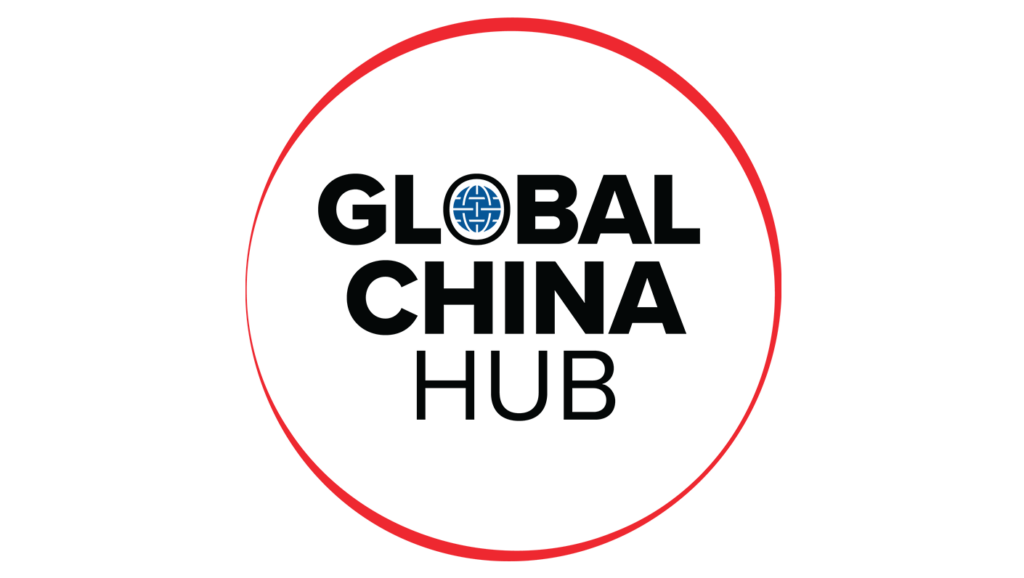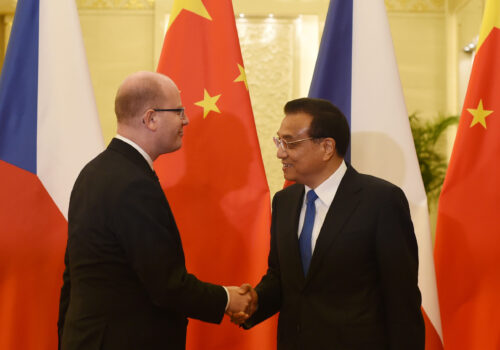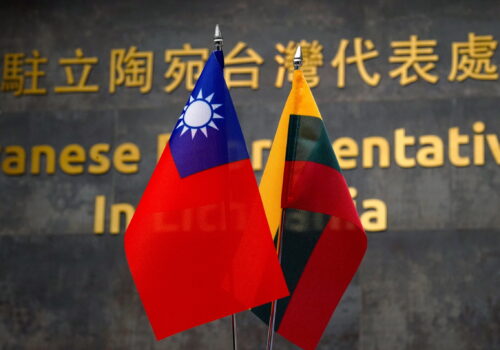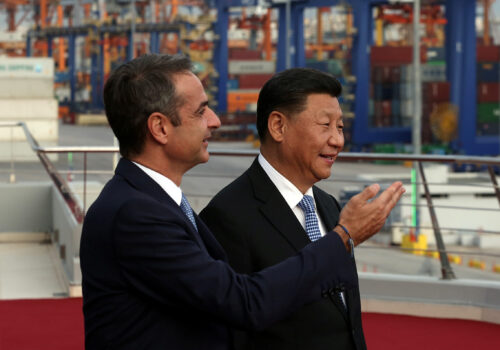Poland’s policy on China: From partnership to skepticism
This is the eighth chapter of the report “Is Europe waking up to the China challenge? How geopolitics are reshaping EU and transatlantic strategy.” Read the full report here.
Poland has traditionally anchored its foreign policy in the transatlantic alliance, yet since the early 2000s, it also sought to expand economic engagement with China. By the late 2010s, however, Warsaw recognized that this approach had yielded few tangible returns. Polish exports gained little market access, and Chinese investment remained limited. From 2019 onward, Polish policy gradually hardened, aligning with the European Union’s (EU) own shift toward a hawkish stance on China. Russia’s full-scale invasion of Ukraine and Beijing’s support for Moscow further accelerated Poland’s reassessment, reinforcing its alignment with the United States while exposing the absence of a coherent China strategy. President Andrzej Duda continued to advocate for selective economic cooperation with Beijing, albeit with limited results. Meanwhile, Warsaw’s application of investment-screening mechanisms and its response to US efforts to exclude Huawei and other Chinese firms from 5G networks remained cautious. At the EU level, Poland opposed the Comprehensive Agreement on Investment (CAI) and endorsed the Union’s emerging economic-security and “de-risking” agenda.
During the Cold War, as a Soviet bloc country, Poland’s ties with China fluctuated according to Sino-Soviet relations. Poland recognized the People’s Republic of China (PRC) shortly after its founding in October 1949, and diplomatic relations were established. Chinese Premier Zhou Enlai visited Poland twice, and several Polish leaders paid visits to China in the 1950s, signaling friendly relations. Following the Sino-Soviet split in the 1960s, the relationship between Poland and China significantly cooled. In the 1980s, however, Polish-Chinese ties were revived: Polish President and Communist Party leader Wojciech Jaruzelski visited Beijing in 1986, and China’s Premier and General Secretary of the Chinese Communist Party (CCP) Zhao Ziyang reciprocated with a visit to Poland the following year. As with other former Soviet bloc countries that were now shaping their own external relations after decades of Soviet control, Poland turned its foreign policy toward Euro-Atlantic partners as well as EU and NATO membership. Consequently, its relationship with China remained limited and largely inactive during the first post-Cold War decade.
Poland’s relations with China intensified significantly in the early 2000s. At the time, the country saw great economic opportunity in closer ties with Beijing and followed an engagement strategy pursued by most North American and European countries after the Cold War. During Hu Jintao’s state visit to Poland in 2004, the two countries signed an agreement to establish “a friendly and cooperative partnership,” a formal designation emphasizing economic cooperation. In 2011, China upgraded its ties with Poland to a “strategic partnership,” reflecting Poland’s broader political and economic significance.1Helena Legarda, “From Marriage of Convenience to Strategic Partnership: China-Russia Relations and the Fight for Global Influence,” Mercator Institute for China Studies, August 24, 2021, https://merics.org/en/comment/marriage-convenience-strategic-partnership-china-russia-relations-and-fight-global; Lukas Fiala; “How Are We to Understand China’s International Partnerships?” China-Global South Project, April 21, 2023, https://chinaglobalsouth.com/analysis/how-are-we-to-understand-chinas-international-partnerships/; Jacob Mardell, “Building Partnerships with China ‘for a New Era,’” Royal United Services Institute, December 17, 2024, https://www.rusi.org/explore-our-research/publications/commentary/building-partnerships-china-new-era. In 2012, Poland became a founding member of the Cooperation between China and Central and Eastern European Countries (initially the “14+1”, later the “16+1” format).
Throughout most of the 2010s, Polish policy on China remained cooperative. As a result of its earlier engagement posture, Poland continued to view Beijing primarily as an economic partner, avoiding confrontation and prioritizing opportunities for trade and investment. For the same reason, Poland largely stayed out of EU-level debates on China, focusing instead on bilateral engagement.
However, Poland’s policy toward China began shifting in 2019, driven by three factors: intensifying US-China strategic competition, Russia’s war on Ukraine (backed by China), and China’s growing economic challenge to the EU. These developments pushed Poland to adopt a firmer stance and align with the EU’s increasingly assertive China policy. After 2019, leaders of the two countries did not conduct mutual visits for several years, exchanging only phone calls and occasional meetings on the margins of international gatherings. By the end of the COVID-19 pandemic, the relationship had deteriorated further, as China’s pandemic policies, diverging interests, and trade imbalances effectively froze progress.2Marcin Przychodniak, “The Rough ‘Strategic Relationship’ Between Poland and China,” China Observers in Central and Eastern Europe, January 25, 2021, https://chinaobservers.eu/the-rough-strategic-relationship-between-poland-and-china.
Russia’s invasion of Ukraine in February 2022 made matters worse, pushing the bilateral relationship into crisis. As Poland focused on responding to Russia’s aggression, China’s support for Moscow deepened Warsaw’s mistrust. Even after the 2023 elections, in which the centrist Civic Coalition (KO) defeated the conservative-populist Law and Justice Party (PiS), Poland’s wariness of Beijing remained unchanged.
Still, Poland did not sever its economic ties with China. Instead, during the period of political cohabitation between 2023 and 2025, it adopted a dual-track approach: Donald Tusk’s KO-led government emphasized economic and national-security resilience, while President Duda of PiS pursued continued diplomatic and trade engagement. While this division of labor highlighted the lack of a coherent, unified China strategy, it also signaled that Polish leaders were increasingly recognizing that the country’s engagement approach had not yielded the results they had hoped for. Polish markets had not expanded, and the risks to both domestic companies and the broader EU economy had increased. Consequently, Poland began actively contributing to EU policy on China, supporting the European Commission’s tougher approach and its “de-risking” strategy.3“Poland’s Strategic Convergence with the United States and Managed Detachment from China,” Debug Lies News, July 19, 2025, https://debuglies.com/2025/07/19/polands-strategic-convergence-with-the-united-states-and-managed-detachment-from-china/; Alicja Bachulska, “Multi-Pole-Arity: How Poland Can Help Europe Think Big on China,” European Council on Foreign Relations, April 15, 2025, https://ecfr.eu/publication/multi-pole-arity-how-poland-can-help-europe-think-big-on-china; “Profiling European Countries’ Resilience towards China,” Mercator Institute for China Studies, October 31, 2024, https://merics.org/en/report/profiling-european-countries-resilience-towards-china.
As of 2025, while the Tusk government’s commitment to balancing and de-risking is clear, the position of Poland’s new President Karol Nawrocki (PiS) remains uncertain. Nawrocki’s foreign policy combines transatlanticism, Euroskepticism, and a sovereignty-first approach. His alignment with US President Donald Trump and the MAGA movement may further complicate his China policy, given that the second Trump administration has not yet settled on a consistent strategy, oscillating between engagement and balancing. Nevertheless, his September 2025 meeting with Chinese Foreign Minister Wang Yi suggests he may preserve elements of Duda’s engagement approach.4Marcin Jerzewski, “Pragmatism Without Principles? Poland-China Relations under Karol Nawrocki’s Presidency,” China Observers in Central and Eastern Europe, June 10, 2025, https://chinaobservers.eu/pragmatism-without-principles-poland-china-relations-under-karol-nawrockis-presidency/; “Polish President Vows to Further Ties with China,” Xinhua News Agency, September 16, 2025, https://english.www.gov.cn/news/202509/16/content_WS68c8b355c6d00fa19f7a27b6.html.
Trade and investment: Lost illusions
Successive Polish governments, regardless of their ideological leanings, have pursued a cooperative strategy toward China in hopes of gaining economic benefits. Yet Poland remains one of the EU countries least dependent on China for trade and investment. Exports to China account for just 0.57 percent of gross domestic product and 1.03 percent of total exports.5Bachulska, “Multi-Pole-Arity.” Still, Warsaw is Beijing’s top trading partner in Central and Eastern Europe, while Beijing ranks as Warsaw’s second-largest trading partner in the region, after Germany. The relationship, however, is highly imbalanced. In 2024, China exported €34.3 billion in goods to Poland, while Poland exported only €3.3 billion to China—creating a nearly €31 billion trade deficit. This was the EU’s largest deficit with China after the Netherlands and Italy, and the tenth largest globally. Poland’s exports to China are concentrated in copper, electronic equipment, optical instruments, machinery, vehicles, wood, charcoal, and nuclear reactors and boilers.6“China-EU—International Trade in Goods Statistics,” Eurostat, February 2025, https://ec.europa.eu/eurostat/statistics-explained/index.php?title=China-EU_-_international_trade_in_goods_stati; Konrad Rajca, “Poland External Relations Briefing: The State and Prospect of Polish-Chinese Relations,” China-CEE Institute, March 22, 2024, https://china-cee.eu/2024/03/22/poland-external-relations-briefing-the-state-and-prospect-of-polish-chinese-relations/; “China-Poland Bilateral Relations: Trade and Investment,” China Briefing, June 28, 2024, https://www.china-briefing.com/news/china-poland-bilateral-relations-trade-and-investment.
Agriculture has been one of the sectors most eager for closer ties with China, hoping to secure access to the Chinese market. However, Polish agriculture has struggled to benefit from the China trade relationship. To make matters worse, Beijing’s new food security law, adopted in mid-2024, further complicated conditions for Polish producers.7Bachulska, “Multi-Pole-Arity.”
Chinese investment in Poland has remained modest, totaling only €2.5 billion between 2000 and 2024.8Agatha Kratz, et al., “Dwindling Investments Become More Concentrated—Chinese FDI in Europe: 2023 Update,” Mercator Institute for China Studies and Rhodium Group, June 6, 2024, https://merics.org/en/report/dwindling-investments-become-more-concentrated-chinese-fdi-europe-2023-update. Nonetheless, Warsaw has increasingly come to recognize that Chinese investments are a potential vulnerability. Poland was among the first EU countries to join the Belt and Road Initiative (BRI), and its strategic role in the initiative is underscored by the fact that nine out of ten China-Europe Railway Express trains either transit through Poland or terminate there.9Bachulska, “Multi-Pole-Arity.” Over the past two decades, Poland has sought to develop its own economic security toolkit. It adopted the Act on Competition and Consumer Protection in 2007, the Act on the Control of Certain Investments in 2015, and the Polish Competition Authority’s foreign investment screening mechanism in 2020. Implementation, however, has lagged. In 2017, the Polish Competition Authority approved the planned acquisition of Konsalnet, a leading Polish security firm, by China Security & Fire—only for the Beijing headquarters to halt the deal due to the company’s financial troubles. In 2021, the Polish regulator also investigated Changjiu Logistics’ investment in transportation company Adampol S.A, but found no violations, allowing the transaction to proceed. Although both investments involved potential risks to Poland’s national and economic security, the responses by the authorities and the public were limited, suggesting significant gaps in the country’s ability to manage such risks.10“Streamlining Foreign Investment and CFIUS Processes: What You Need to Know,” Clifford Chance, December 2023, https://www.cliffordchance.com/briefings/2022/04/streamlining-foreign-investment-and-cfius-processes–what-you-ne0.html; “Changjiu Logistics (603569.SH) to Buy 30-Pct Stake in Poland’s ADAMPOL S.A.,” Xinhua Silk Road, March 2, 2021, https://en.imsilkroad.com/p/320010.html; Bachulska, “Multi-Pole-Arity”; “China Security & Fire to Buy Konsalnet for up to 110 Mln Euros via Its Polish Unit,” Reuters, March 17, 2017, https://www.reuters.com/article/technology/china-security-fire-to-buy-konsalnet-for-up-to-110-mln-euros-via-its-polish-un-idUSL3N1GU3YO.
Technology: De-risking in telecommunications
Poland’s stance on China in technological matters has also shifted considerably over the years. In telecommunications, Chinese companies Huawei and ZTE once played a prominent role in Poland’s economy. Between 2006 and 2019, Huawei helped build Poland’s 2G and 3G networks, leaving the telecommunications heavily reliant on Chinese technology and systems.11Bachulska, “Multi-Pole-Arity.” However, such cooperation has unraveled in recent years.
In 2019, Poland arrested a high-level Chinese Huawei employee, charging him with espionage on behalf of China. The individual had worked with Huawei for eight years and previously served at the Chinese Consulate, and he was charged alongside a Polish man who had previously worked for Polish security services. The scandal placed Huawei and 5G on the agenda as potential vulnerabilities in Polish critical infrastructure. As the first Trump administration pressured allies to exclude Huawei from their 5G networks, this issue became central to negotiations between the United States and Poland. During Vice President Mike Pence’s visit to Poland in September 2019, the two countries signed an agreement on 5G cooperation, which established criteria for vetting telecom equipment suppliers based on security risks. In August 2020, they concluded the Enhanced Defense Cooperation Agreement, strengthening US-Polish defense cooperation and increasing US military presence in Poland—a development that would not have been possible without alignment on 5G.12Pawel Paszak, “Poland-China Relations in 2021: Current State and Prospects,” Warsaw Institute, January 29, 2021, https://warsawinstitute.org/poland-china-relations-2021-current-state-prospects; Bachulska, “Multi-Pole-Arity”; Christina Farr, “Huawei Fires an Employee in Poland, Following Charges of Espionage: Wall Street Journal,” CNBC, January 12, 2019, https://www.cnbc.com/2019/01/12/huawei-fires-an-employee-in-poland-following-charges-of-espionage.html; “The Clean Network,” US Department of State, last visited September 12, 2025, https://2017-2021.state.gov/the-clean-network; “Home,” Clean Network, Krach Institute for Tech Diplomacy, last visited September 19, 2025, https://techdiplomacy.org/tech-statecraft; Andrzej Dąbrowski, “The Clean Network Initiative as an Element of the U.S.-China Competition,” Polish Institute of International Affairs, October 18, 2019, https://pism.pl/publications/The_Clean_Network_Initiative__as_an_Element_of_the_USChina_Competition; “U.S.-Poland Joint Declaration on 5G,” White House.” September 5, 2019, https://trumpwhitehouse.archives.gov/briefings-statements/u-s-poland-joint-declaration-5g/; Jill Colvin, “US and Poland Sign Agreement to Cooperate on 5G Technology,” Associated Press, September 2, 2019, https://apnews.com/article/9a90e16d903947709998dd7a2dde8733; “New U.S.-Poland Enhanced Defense Cooperation Agreement Signed,” Ministry of National Defence, Republic of Poland, August 15, 2020, https://www.gov.pl/web/national-defence/new-us-poland-enhanced-defense-cooperation-agreement-signed.
Guided by US initiatives and the EU’s 5G Toolbox, Poland decided to ban Huawei and ZTE from the country in 2020—a move that Huawei protested by sending a complaint to EU Competition Commissioner Margrethe Vestager.13Laurens Cerulus, “Huawei Challenges Legality of 5G Bans in Poland, Romania,” Politico, November 2, 2020, https://www.politico.eu/article/huawei-hints-at-legal-action-against-5g-bans-in-poland-romania. Despite the ban, Poland allowed the companies to maintain limited operations while diversifying its telecommunications market. In recent years, Warsaw has repeatedly considered legislation to phase out Huawei’s and ZTE’s equipment from its telecommunications sector, most recently in October 2024—and the Polish parliament ultimately adopted an amendment to the National Cybersecurity Certification Act, implementing the EU’s NIS2 Directive on the security of network and information systems.14Zoltán Kész, “Reducing Chinese Influence in the EU’s Telco: Poland Moves Ahead.” EU Tech Loop, October 14, 2024, https://eutechloop.com/reducing-chinese-influence-in-the-eus-telco-poland-moves-ahead/. The amendment introduced a new certification system for telecommunications companies operating in critical sectors, potentially designating some firms as high-risk suppliers and requiring them to replace previously provided hardware or software.15“New Polish Act on the National Cybersecurity Certification System and Its Key Assumptions,” Clifford Chance, August 5, 2025, https://www.cliffordchance.com/content/cliffordchance/briefings/2025/08/new-polish-act-on-the-national-cybersecurity-certification-syste.html; “Implementation of the Cybersecurity Directive (NIS2) in Poland,” Dentons, August 28, 2025, https://www.dentons.com/en/insights/newsletters/2025/august/8/powered-by-dentons/powered-by-dentons-august-2025/implementation-of-the-cybersecurity-directive-nis2-in-poland; “NIS2 Directive: Securing Network and Information Systems,” European Commission, December 2022, https://digital-strategy.ec.europa.eu/en/policies/nis2-directive.
Security: The Ukraine war and hardening threat perceptions
In the security domain, Russia’s invasion of Ukraine, China’s support for Moscow, and intensifying US-China strategic competition have heavily influenced Poland’s approach to China. Poland’s steadfast support for Ukraine and its advocacy for transatlantic unity against Moscow have shaped both its Russia and China policies. Leaders from both major political camps have consistently urged China to help end the war and halt economic and military support for Vladimir Putin’s regime.
In 2023, Prime Minister Mateusz Morawiecki (PiS) highlighted Poland’s policy shift in a speech at the Atlantic Council. He warned that European countries incur “a huge geopolitical cost” when selling goods to China, and that China and Russia obtain Western technology to eventually use it against the West. He also urged allies and partners to support Ukraine to protect the status quo in Taiwan, asserting that “if Ukraine gets conquered, the next day, China can attack Taiwan.”16Katherine Golden, “Poland’s Prime Minister: Western Europe Needs to Commit to Ukrainian Victory and Beware of China,” Atlantic Council, April 14, 2023, https://www.atlanticcouncil.org/blogs/new-atlanticist/polands-prime-minister-western-europe-needs-to-commit-to-ukrainian-victory-and-beware-of-china. Beijing immediately protested the prime minister’s statements.17“China Accuses Poland of Meddling in Its Affairs after PM’s Taiwan Comments,” Reuters, April 14, 2023, https://www.reuters.com/world/china-accuses-poland-meddling-its-affairs-after-pms-taiwan-comments-2023-04-14/.
The current Civic Platform-led government has continued this approach. During Chinese Foreign Minister Wan Yi’s visit to Poland in September 2025, Foreign Minister Radosław Sikorski “called on China to step up diplomatic efforts to end the fighting in Ukraine” and “urged China to cease its exports of dual-use products to Moscow, including drones and navigation equipment.” Sikorski added, “without Beijing’s help, Russia’s economy would have collapsed by now.”18Natalia Ojewska, “Poland’s Sikorski Urges China to Help Secure Peace in Ukraine,” Bloomberg, April 23, 2025, https://www.bloomberg.com/news/articles/2025-04-23/poland-s-sikorski-urges-china-to-help-secure-peace-in-ukraine.
Poland has also faced security concerns over Chinese involvement in its port infrastructure. A subsidiary of Hong Kong-based CK Hutchison, Hutchison Port Holdings, had leased a terminal in Gdynia since 2007. By 2024, the lease raised alarms due to its proximity to a dock where the United States and NATO unload military aid for Ukraine. At parliament’s urging, the Polish government eventually designated Gdynia port as critical infrastructure and required reporting on its operations. In an unexpected turn, the national security issue surrounding the port has since moved toward resolution. Encouraged by Trump, the US investment fund BlackRock purchased a majority share in the ports operating in the Panama Canal from Hutchison, with the deal also including equity in other ports, such as Gdynia, potentially bringing them under US ownership. However, the deal is still in flux, both because China has refused to approve it and because the Panamanian government has asked the Supreme Court to annul Hutchison’s previous contract for procedural flaws.19Jeremy Van der Haegen and Wojciech Kość, “Chinese Presence in a Polish Port Triggers Security Fears,” Politico, April 3, 2024, https://www.politico.eu/article/hong-kong-based-chinese-company-presence-polish-port-creates-security-worries-nato/; Elida Moreno, “CK Hutchison-Operated Panama Ports Could Be Taken over by State Partnerships, President Says,” Reuters, July 31, 2025, https://www.reuters.com/business/retail-consumer/ck-hutchison-operated-panama-ports-could-be-taken-over-by-state-partnerships-2025-07-31/; Arjun Neil Alim, Cheng Leng, and Chan Ho-Him, “Panama Ports Deal Will Not Close This Year, Warns CK Hutchison,” Financial Times, August 14, 2025, https://www.ft.com/content/8d5badf4-7b54-4094-8c26-ace5e9aca8f2.
Overall, Poland’s position has become more consciously aligned with the United States, centered on robust defense cooperation, while pursuing a measured disengagement from China in response to Beijing’s continued support for Russia’s war effort.20“Poland’s Strategic Convergence with the United States and Managed Detachment from China.”
Poland’s alignment with the EU’s China policy
In the past six years, while China’s competitiveness has posed increasing challenges for the EU, Poland’s positions on China have hardened across key domains. During this period, Poland has increasingly recognized the interconnectedness of its bilateral and EU-level relations with China. Consequently, Polish governments of various ideological compositions have sought to participate more actively in EU policy debates, and Poland’s positions on EU China policy have evolved accordingly.
Poland has weighed in on the EU’s CAI with China. When the European Commission concluded negotiations with China on the agreement in December 2020, its failure to submit a draft to the Committee of Permanent Representatives—the body that prepares the Council of the EU’s work—prompted criticism from several member states, including Poland. To clarify Poland’s position, Foreign Minister Zbigniew Rau stated that the EU should pursue a mutually beneficial agreement with China and allow time to consult with the United States to find common ground on the CAI. Warsaw’s concerns included the deal’s implications for both Poland and the EU, as well as potential consequences for the United States. US National Security Advisor Jake Sullivan echoed this view, noting that “the Biden-Harris administration would welcome early consultations with our European partners on our common concerns about China’s economic practices.” Facing pressure from EU member states, the European Parliament, and the United States, the CAI eventually collapsed.21“Poland-China Relations in 2021”; Przychodniak, “The Rough ‘Strategic Relationship’ Between Poland and China”; Stuart Lau, “On Brink of China-EU Deal, Fresh Pressure Hits from US and Poland,” South China Morning Post, December 23, 2020, https://www.scmp.com/news/china/diplomacy/article/3115087/brink-china-eu-investment-deal-eleventh-hour-pressure-comes.
In recent years, Poland has recognized that China’s economic and competitiveness challenges cannot be effectively addressed solely at the bilateral level. EU-level policy must be strengthened to protect the Polish economy from China’s unfair practices and coercion. Polish policymakers acknowledge that, while many EU member states continue to emphasize bilateral engagement with China, the scale of asymmetry makes it impractical for any single state to manage Beijing’s challenges alone—underscoring the increasing need for collective, EU-level responses.22Bachulska, “Multi-Pole-Arity.” As a result, the Polish government supported the Commission’s adoption of the European Economic Security Strategy in 2023 and has consistently backed its de-risking measures. Poland also voted in favor of the Commission’s proposal for the EU to impose tariffs on Chinese electric vehicles under the Foreign Subsidies Instrument in March 2025, arguing that Chinese state subsidies distort fair competition and create vulnerabilities in strategic industries.
Conclusion
Despite its traditionally transatlantic orientation and firm opposition to Russia, Poland maintained an engagement policy toward China from the early post-Communist transition until the late 2010s. For much of this period, Warsaw viewed China primarily through an economic lens: policymakers and business groups anticipated that greater Chinese market access would boost Polish agricultural and industrial exports, while Chinese capital inflows were expected to support domestic investment. These expectations gradually eroded in the 2010s, as China failed to provide substantive trade concessions or investment opportunities. At the same time, Russia’s increasingly aggressive behavior heightened Poland’s sense of strategic vulnerability.
The combination of unmet economic promises and Beijing’s alignment with Moscow following Russia’s invasion of Ukraine reshaped elite perceptions of China, framing it as a systemic challenge rather than an economic opportunity. In response, Poland has undertaken a pronounced policy adjustment—supporting EU-level instruments under the Economic Security Strategy and developing domestic mechanisms to enhance resilience against China-related economic and strategic risks. Although partisan polarization continues to complicate consensus on China policy, Warsaw’s overall trajectory now reflects a deliberate and measured shift toward balancing and de-risking vis-à-vis Beijing.
About the author
Related content
Explore the programs

The Global China Hub tracks Beijing’s actions and their global impacts, assessing China’s rise from multiple angles and identifying emerging China policy challenges. The Hub leverages its network of China experts around the world to generate actionable recommendations for policymakers in Washington and beyond.

The Europe Center promotes leadership, strategies, and analysis to ensure a strong, ambitious, and forward-looking transatlantic relationship.



